M USE 2024
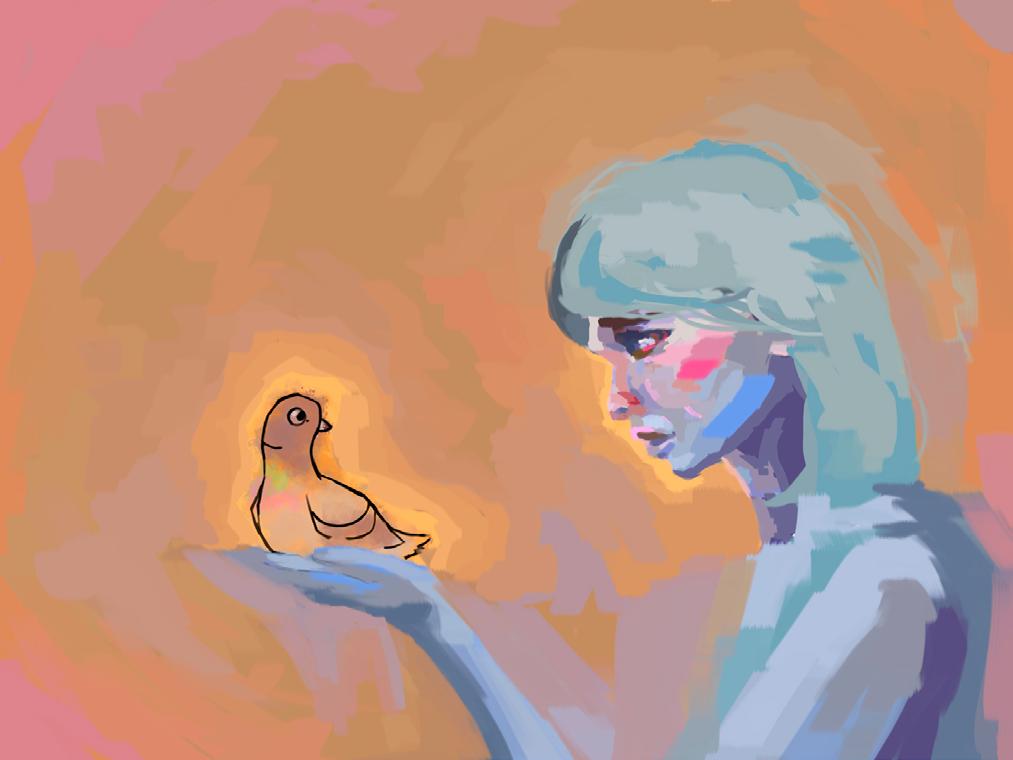

M USE 2024
Editors, Members, and Sponsors of The MUSE
Lead Editor
Lucian Hargrave ’24
Olga Meserman ’24
Editorial Team
Ada Habip ’25
Camila Horta ’25
Members & Contributors
Abigail Araia ’24
Betty Araia ’26
Rebecca Berberi ’25
Owen Bergstein ’26
Celine Cheung ’25
Audrey Chuang ’27
Leone Levi D’Ancona ’27
Aparna Deokar ’24
Angel Dong ’26
Nicole Hadar ’27
Charlotte Harris ’26
John Hay ’27
Finn Hoebelheinrich ’25
Momoko Hotta ’26
Matty Jackman ’26
Saanvi Jegan ’27
Hana Kaneko ’27
Nick Kohl ’26
Georgie Linscott ’26
Kelsey Liu ’26
Ytien Liu ’25
Suzanna Luptakova ’24
Dora Mou ’27
Coco Mueller ’26
Arden Nasveschuk ’26
Daniel Shaer ’26
Cici Ye ’27
Faculty Advisor
Ms. Ariana Kelly
Special Thanks
Mr. Christos Kolovos
Ms. Lisa Townley
Art Contributors
Beatrice Bellinger ’27
Michael Butler ’25
Tai Chu-Shore ’26
Elise Despujols ’26
Kelsey Liu ’26
Dora Mou ’27
Angela Noyes ’25
Front Cover Art
Matthew Wu ’26
Back Cover Art
Anonymous
Printer
Jay Arthur, ProPrint
Typesetting and layout by Julie Gallagher, whom we continue to thank for her marvelous work and generous attention to our magazine year after year.
Copyright © 2024
Boston University Academy Boston, Massachusetts
Editors’ Note
Dear Readers:
We’re extremely excited to present to you this year’s edition of The Muse. We have some incredible poems, short stories, and student art to share with you this year and we hope it’ll bring you some respite from the hustle and bustle of the school year as it comes to a close. There is a wide variety of material in this year’s edition, and we hope that some pieces from this year’s edition resonate with you.
LitMag 2024 would not be in your hands right now without the help of some incredible people. First and foremost, Ms. Kelly has provided us with incredible support and encouragement as we’ve navigated creating this year’s edition. From helping us reach out to the BUA community, to keeping us on track, we’ve been so lucky to have had her incredible leadership this year!
We’d also like to take this opportunity to thank the one and only LitFam. It’s been such an amazing year getting to not just hear your comments and feedback, but to get to know you all as writers and as friends! We truly had a remarkable group of passionate, hardworking writers this year and are so proud of the community that LitMag has cultivated over the years.
We’d also like to thank Ms. Julie Gallagher, our typesetter, and Frank, our printer, for making LitMag truly come to life! Lastly, we’d like to thank Ms. Townley and Ms. Doust for all of their work which has resulted in fantastic student art.
This is my (Olga’s) third year on LitMag and, as a co-head editor, I’ve really enjoyed witnessing the club members grow throughout the years, not just in their writing, but in the confidence they have to share it with the group. I’m sad to graduate knowing that I’ll never get that same experience workshopping, editing, or commenting on a piece as I have with this particular group, but I cannot wait to see (and read) what the next generation of LitMag has in store for us!
Olga Meserman
For me (Luke), it has been an absolute honor to be a part of LitMag. I think that one of the best ways for an artist to progress is to work in a community open to collaboration, commentary, and critique. LitMag meets and exceeds this standard: whether reviewing a piece or trying to split snacks evenly, the people of LitMag support and rely on each other. In short, the LitFam really does feel like a family. Thank you all for this incredible, irreplaceable experience, and I wish you well in your future writing.
Luke Hargrave
In Place
I watch the drooping branches of the weeping willow Flowing back and forth with each gust of wind. But roots hold the giant. Centered, unrelenting, resisting movement, preventing change.
The roots have value, their strength has meaning, But you can’t grow up if you’re held in place. I feel cornered, scared, enclosed, but I can move! I can sway like the leaves and branches, Held in place, but still free. Balanced.
But balance is hard to find in a world That tries to keep you planted or blow you up into the air, Never to be seen again.
In this world balance is rare, but we can hope. Hope that it’s possible to rise and change and break away While never outgrowing what holds you in place. In this new season of our lives, we must, can, and will embrace the wind, cling to our roots, and grow in every moment.
My Two Primal Urges
Ever since I moved to America in 2018, the American me has been battling with the Chinese me ever since. Why, you might ask. You are probably expecting an emotional tale with twists and turns, but my answer is condensed to three words. Not. Enough. Space. Duh. They are quite like Yin and Yang, or angel and devil, but to the very, very extreme. My two primal urges, one controls my language and communication, and the other controls my thoughts.
Even at Market Basket, the two forces battle over each other to assert dominance. To be, or not to be? That is the question. To be the delicious, nutritious rice-cakes or to be the spicy, finger-licking Doritos? That is also the question. The Chinese me ran for the rice-cakes, while the American me saved the Romeo-to-Juliet lovesick gaze to the Dorito chips. After what seemed like a century of tug of war, my two urges decided to spar against each other, conscience to conscience. If one can imagine the spar, it would all-out brawling, pulling hair, and calling each other names that made my head press the “beep beep” button continuously.
After several rounds of conscience fighting, or rather, brain frying, my hands decided that it was time to declare the winner. I reached out my hands, and . . . successfully tossed both the rice-cakes and Doritos into my shopping cart, and ran straight for the register.
My Yin versus Yang, Violence is not the answer.
I can strife for peace.
Ink Colored Pencil
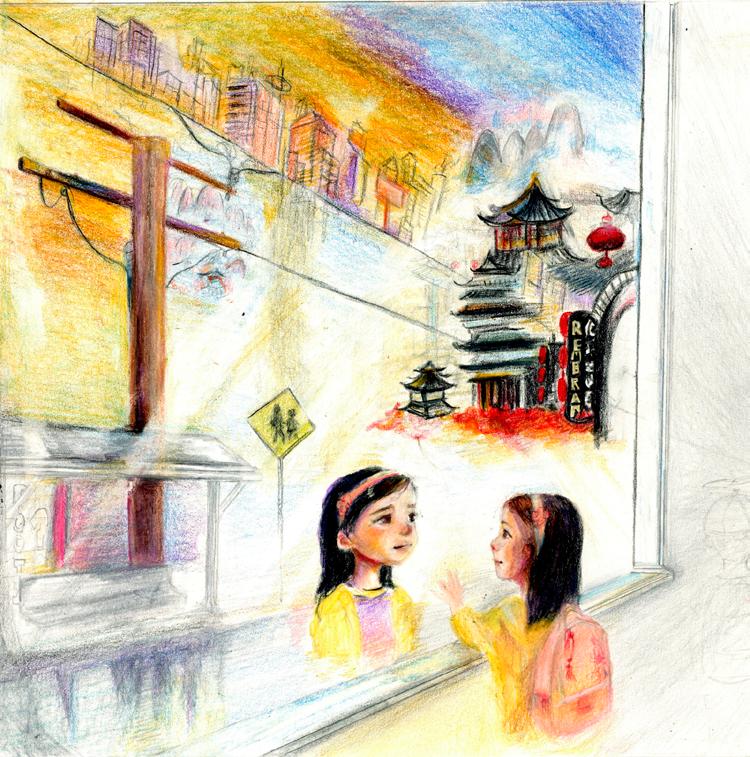
The Balloon Men and Waterfed Women
Heads around us bobbed and swelled, they courted us In between bouts of gorging on common bread, and dared to call us waterfed!
Heads around us grew and grifted, swollen skulls fighting hard to be the first to fill the room and suck up all the air between swollen lips reddening from copious teething competitive breathing!
II
A miracle!
the first simultaneous coronation
So many good men crowned at the funeral of one?
I offer each of you a curtsey And to your lovely courtesan So fair her lips are shrinking violets
So good luck charm she blinks in threes She holds her breath, what courtesy!
A miracle!
That diadems can fit around engorging heads
Through a squint every sparkle is a bloated glare.
III
Heads around became distended, rising as we lost their fancy moving in a static frenzy
They can twist into new shapes, a head alone becomes an animal
All of you balloon-men contort yourselves into a zoo and comport yourselves that way too.
Waterfed women watch and slosh below. Someone has emptied the sharps bin: a hard rain is coming.
Clocks
Oh timer, herald caffeinated lands
For twilight I’d exchange with azure skies
So I could hold your ticking tocking hands’ encircling cycling ten and two reprise.
Your barren, blank and shining midnight face
As bright as light above the ocean rocks
Oh, set the knotted string of time in place
And guide the wayward sailors home, dear clocks.
Entwine my hair with gray and crease my skin, Whilst I do beg for grace upon my soul, But you ignore my pleas and take my kin
Then I will rot beneath the steeple’s toll.
Oh, even once my body leaves its mark, Your vessel’s pulse will light the dayless dark.
Owen Bergstein ’26
Cloud Cover
The rain always seems to know.
It seeps heavier on you when the world stains blue, when your thoughts drip and gurgle to the gutter. When you crave coziness, it indulges you, crumbling on your parents’ shingled roof and slipping down in sheets, down on the little red wagon parked in the daisies you used to harvest with your mom, back when you were little and not like this. And when you’re holding a secret, the rain knows best of all. Like a boxer in a ring, it jabs and cuts, catching that one spot on the back of your neck where your scarf can never quite dry. It’s the accuser, the punisher, the jury and judge.
It’s raining hard today. Drops corrupt your guilt-read smut of a novel as you walk through Central Park with your gray Starbucks mug filled with fruity tea and more than a few shots of regret. There’s a silky gray palace of heaven above, leering down in judgment. Your head explodes with every bomb plunging from the warplanes of clouds. The war planes fight a war of reconquest, a war of rightful indoctrination, a war of fixing a war of saving of inquisition and repenting and stop.
You think of texting your therapist but she doesn’t really like you anyways.
As you stroll one of the city’s most vertical blocks, you yearn to scream it from the rooftops, then plunge with the bullets of wet. Wouldn’t it be nice to be another one of the clouds’ secrets? A summer storm, alive, unburdened and then unburdening, inflicting pain no longer, at last washing away into the dirt where you belong! But then, of course, you’d never feel the rain of freedom.
You’ve heard about the way freedom rains, and it should rain, this is the city where it does rain, this is the city of change and progress and unsleeping demands for a better world!
Lady Liberty sings her bittersweet notes into every drop of rain, they tell you. All the other New Yorkers march in that rain, bask in that rain, kiss in that rain. But you understand the downpours better than those tongue-tied, lying lovebirds. More aware than ever of the rain’s silent vigil, you see the hate it carries as it shudders across the pollen-soaked ashes above you. Maybe tomorrow you’ll tell, but until then, you’ll sip your ever-diluting, skyfall-soaked tea with patient indulgence. And though the gravel stains in rainbows with the chromatic crumbs of your being, you haven’t been entirely eroded yet. And for now, at least the rain knows.
The World In My Eyes
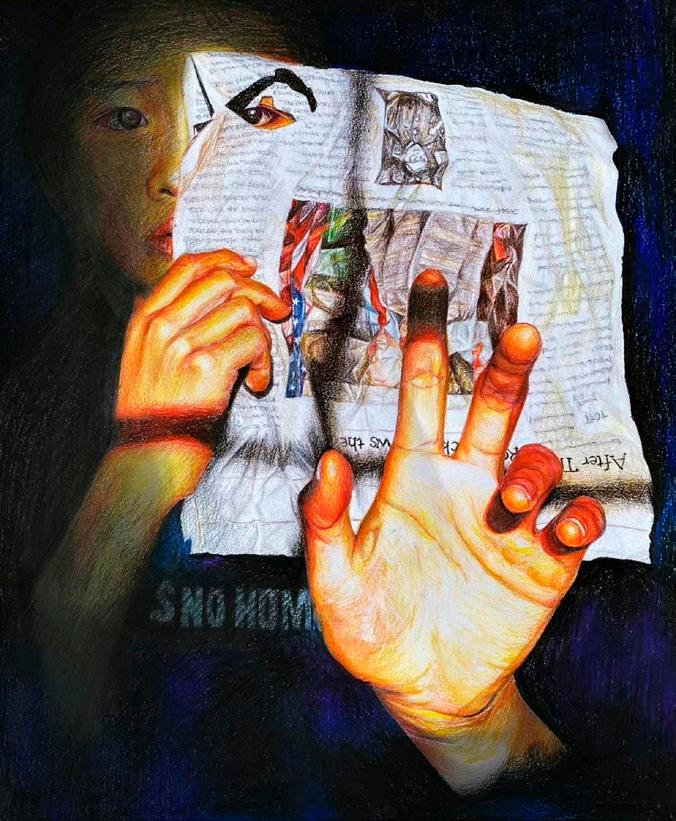
Coming Around Again
7:30 am. Day 1. I almost didn’t go in, but something about the smell of coffee warming the cold morning air must’ve won me over. I told myself I was getting better at restraint, but my caffeine addiction proved me wrong. Amused by my own habitual antics, I gave myself a smile—something of a rare occurrence—and heard the bell ring as I opened the door, warm air and the scent of coffee hitting my nose so hard I was surprised it was still intact. You know what they say, that every time a bell rings an angel gets its wings? I never believed that until now. I never believed that until the ringing of that bell on the door died down and my eyes were drawn to an angel. I never believed that until you. You sat there alone at a table in the window, both hands on your cup, lonely eyes dripping into the brown potion below. I noticed as I saw you contrasting the gray world moving past you outside, that you seemed so . . out of place. What was someone like you doing in a place like this? Your face seemed almost blurred from its own radiance, and the clouds sweeping along in the sky above seemed to match your eyes suspiciously well. It was almost as if two pieces of the sky were carved out and given specially to you, just so you could see clearly what us mortals can’t . . . or maybe just don’t.
“D’you mind if I sit?”
I don’t remember speaking, but somehow the words came out of my mouth, as if it were as natural as my heart beating. And suddenly, those pieces of the sky were upon me. Your head snapped up, wispy hair the color of coffee and ground cardamom falling around your face like silk curtains around a window that caught the sun. I’m no expert on emotions, but I saw what could only be described as a surprised mix of melancholy and hopefulness.
“Not at all.”
Day 2 was the same. And the day after that. And the day after that, too. I couldn’t stop myself from coming back to see you. Then, I noticed a change. Your eyes began to not only echo the skies, but reflect my soul. Loneliness gave way to comfort. That “something missing” became something enjoyed. Mornings spent alone. Mornings spent hurrying, pushing past nameless faces, clutching my belongings and fearing the world. Gone. I found that they’d all been replaced by lighter feelings, like
wispy clouds had replaced the previously ever-present overcast state of my heart. Ground cardamom and blue sky. A wall of warm air hitting my wind-chilled face. The smell of the city being replaced with the warm scent of the cafe wafting into the air. This kind of bliss was one I’d only seen poorly imitated by false prophets who claimed themselves holy. No, this time it was real. How do I know? Because only something holy could worm its way everywhere I went. Every glance up at the sky reminded me of your eyes. Every whiff of coffee I smelled from a coworker, hurrying through the office or the streets reminded me of our place. I pitied every poor soldier who couldn’t see what I saw now. I know what it’s like, friend. The world is a cruel boss. You’ll find something to make it worthwhile some day.
Beep. Beep. Beep. Be–click. 6:00 am. Day 30. My eyelids don’t feel nearly as heavy. I like the feeling of the air outside of my bed not feeling so unbearably cold. I get ready. 6:47. I slip my shoes on, but leave without my travel mug. I don’t need caffeine. I have a new addiction, one outside of that alluring potion. I smile to myself—a more common occurrence, now—and step out into the gray world, not caring how much of an idiot I appear to be. I walk just as swiftly as everyone else, but for a different reason. I keep my head up as I walk now, noticing just how many people keep theirs down. I don’t want to be late. It is rude, after all, to keep the divine waiting. I check my watch. I smile again. Today’s gonna be alright, I think, 7:30 is coming around again.
Kaitlyn Tan ’26
Love of Venus
A stone-cold heart will always bow to her, Our Venus has a passion filling words, A feel that no one else can learn for sure; To imitate the dove without her birds.
The beautiful advent will not return, How must one love if hearts will not complain? If knights hold arms and do not pause to yearn, Their loves will always think it was in vain.
Her eye does hold the perfect piece for you, To find and lose is her most painful grace, A story made of splits of fateful twos, Will always be familiar face to face.
Oh Venus, just a small light in the sky, Her gaze transfixes all those passersby.
Alexander Nowosielski-Slepowron ’26
Sonnet
Now how you loved the drifting winter snow
The day depressed to icy low degrees
Yet Flakes of white go paint the sky aglow
The leaves removed to alba’s fainted freeze
Oh yes you love how snowing leaves the sky
As gaudy colors fade into the night
As flakes of white condense upon your thigh
A smile is born; the dusk is set alight
By warmth in, however the snow decays
For winters hot forgo the giving frost
In future, pleasant Snow has given way
To sunlight, leaving Mem’ries dead and lost
And yet, I hope for these winters to hold
Thenceforth till summer you will bask in cold
Camilo Gutiérrez-Lara
Elizabethan Sonnet
Eroded are so many lengthy years The words with which our favorite writers spake. They read as nonsense to perplexed ears: Thus we must learn archaic sounds to make.
‘Tis like to music play’d which doth offend All sense of beat and harmony: unfit For most to hear—much less to comprehend— When that a modern reader readeth it. But music with a beat cannot bring thee Scarce half the pleasure pitchless music doth; For though that they have sense—this much I see— Old words to thee are stuff like fustian quoth. Yet ‘tis more better still than not, I’ll hold, To read what’s writ, and tell as th’ auctor’s told.
Acrylic on Canvas Coins
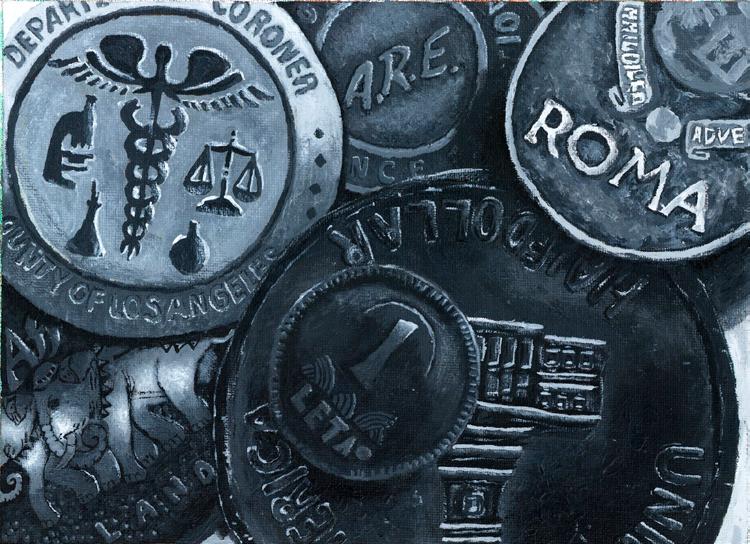
Finn Hoebelheinrich ’25
In a Crash
Twin headlights fill your vision. You squint, swerve; the lights hurt your eyes. You can’t see. They seem to watch you, staring at you as they blind you. Then the lights envelope everything, and they are gone.
You are aware of noise. Then the sounds around you fade to a dull roar, and the only thing you can hear is the music: the percussion of the broken glass tinkling as it falls piece by piece, the singing of the car alarm. You look down at your watch. Your right arm is not at the angle it is meant to be, and you know that should bother you, but it doesn’t. The watch reads 12:03— you were meant to be home an hour ago, but you had stayed out later because . . You aren’t sure, really. It’s hard to remember, so you don’t try. The moon is clear in the sky, made jagged by the edges of the remaining glass. Almost full, but not quite: waxing gibbous, you remember. You have always loved looking at the moon.
You rest your head against the airbag, the effort of holding it upright suddenly unbearable. You can see your watch in your peripheral vision: it still reads 12:03. You notice now that its face is shattered completely. You are aware of the pain in your right arm, in your head, in your abdomen, but it feels insignificant at this moment, when the music is so beautiful. The falling of the glass has slowed, and the car alarm has shut off, so now it is a slow dirge rather than the fast and loud refrain from before. It reminds you of a church hymn. You begin to hum along weakly, adding your own voice to the song.
You wish you could feel this way forever. You are floating, the world hazy around you. The moon is covered by clouds now—are they clouds? you aren’t sure—but you can still see its faint light through the thickness. You feel peaceful, listening to your song.
Lights fill your vision once more, the interior of the car flashing blue, red, blue again. You can’t see the moon now. Sirens screech, drowning out your song and awakening you from your reverie. You would be angry at them for taking away your song and the moon, if you weren’t so tired. A halo of white light comes into view, and you can hear harsh voices shouting as the light swings from side to side. You close your eyes.
Lauren Sadka ’26
The Sun Goes Down, the Mind Wakes Up
Alas, when everyone has gone to bed, The sheath of darkness seals my eyelids tight, And then a new world woven in my head, Of my heart’s tissue wrapping me skin tight.
In dreams I soar above the ground so free, And visit realms of wonderful delight, I leave behind my troubles, carefree, I wish I could prolong this peaceful night.
Deceitful dreams that whisper to my soul, And lure me with a false duality, Oh, just to fill my own heart’s empty hole. They vanish when I face reality.
But what are we except for our own dreams, They shape our own mind’s hopes, our fears, our screams.
Camilla Horta
Prompt: Beautiful Sunset
Two sets of footprints glimmer on the sand. I see the line of them grow as I walk backwards, speaking to the thin air beside me. Standing in the warm and somewhat magical light of the sunset, however, I can see the silhouette of my invisible friend. Looking at him is like looking at the ocean’s reflection, see-through and yet tangible, glittering with purple and orange and pink.
It reminds me of the clouds that wisp around me in the sky, reflecting the sun’s light and coloring the world below. When I am up there, among the wind and the rain, I look just as intangible as my friend, like wisps of fog.
But every day, I have a chance to walk on the beach with him and witness the sky from below. We are only partly visible to each other, me and my friend, in these brief moments of sunrise and sunset, when he is not walking among the inky depths of the night sky, and I am not skipping through the peaks of the morning clouds.
I look back at the ocean, and I notice something glittering in the surf. My friend begins to drift away as the sun sinks below the waves.
I stoop down to pick it up. The glass marble is cool in my palm. It bends the light and color and shape around it. I peer through it at my friend with a smile, and gasp at what I see. Him. For just a second, I can see him completely. The color of his eyes, the tilt of his smile. Then the sun dives below the horizon, the last figments of purple and orange and pink vanish, and he’s gone.
Butler ’25
Sunset
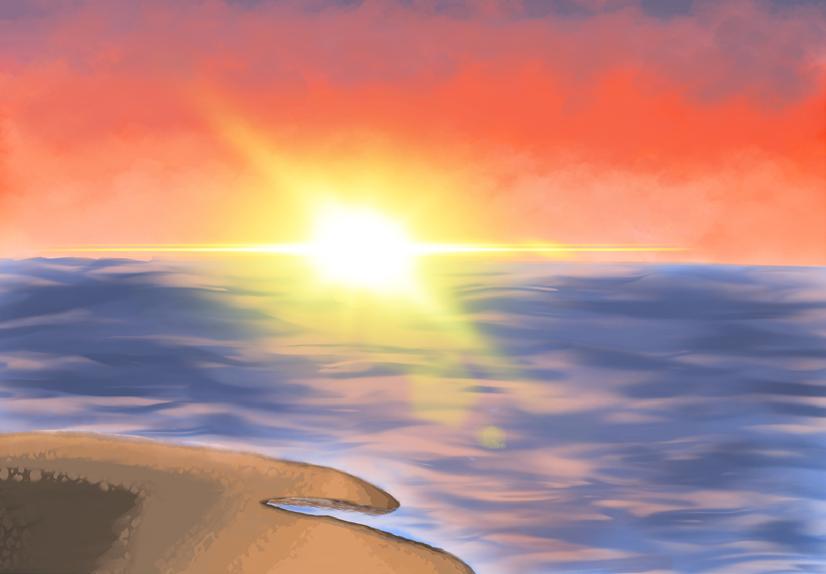
now arriving
boarding the train
i watch the students walk to school listening to music
i watch as the backs of houses fly by checking for my bus
i watch the nurses and doctors get off at the stop by the hospital out of the corner of my eye waiting for the doors to open
i watch the man in a jacket that reads “fenway park tour guide” fidget with his hands as the train slows i don’t know these people but i know a tiny part of their life and together we board the train that is now arriving
A Day in the Life of a BUA Student
2:37 a.m. Went to sleep from the night before. In retrospect, probs should have started studying for precalc before I went into that tractor-themed Instagram Reels rabbithole . . .
3:37 a.m. Alarm goes off. Why am I waking up so late?? I don’t have that much time to watch some more tractor TikToks before catching the train! I seize my phone and dive in.
4:12 a.m. My friend from English is calling me. She forgot her copy of The Odyssey (at 4 in the morning) and needs pictures. I spend 20 minutes taking studious pictures, but just before I upload them to the grade group chat, someone else beats me to it. siiiigh
5:42 a.m. My mom’s on my case to get going. She is NOT GOING TO DRIVE ME THERE THIS TIME, she says, and I say I understand, then spend another 15 minutes on my phone.
5:57 a.m. The train leaves in, like, half an hour, and I haven’t even gotten dressed yet . . I throw on an oversized BUA athletics hoodie over my BUA pajamas and sprint out the door, almost forgetting my seventy-pound child backpack
6:31 a.m. I would say I’m late for the train, but it’s not even here yet. Take that, mom.
6:54 a.m. Where the fuck is this train asdfghjklsdfhl
7:02 a.m. Okay I’m on the train
7:55 a.m. I’m pulling into North Station, listening to Red (Taylor’s Version) for the third time today (I already listened once when I woke up, once while pretending to do homework)
8:31 a.m. I pull up late to ASM but it’s okay because it doesn’t actually start until, like, 8:40—maybe even 8:45 if the speaker can’t figure out the projector (so, probably 8:45)
8:32 a.m. These teachers waste no time. I was just watching the tail end of a farm-vehicle tier list YouTube Short on the way to my seat, but apparently it’s antisocial to have phones within a quarter mile of the law auditorium. I have detention next week.
8:43 a.m. And now, after 11 painfully awkward minutes of craning my neck to talk to my friends two rows behind me, ASM finally starts
10:58 a.m. I’m being super quiet in academic block so the teacher won’t notice I’m playing videogames so all of my classmates can have a kind and curious work environment! yay!
11:40 a.m. Sprinting to the GSU to pick up my Bash –o order before my club starts . . .
11:41 a.m. Where is my Bash –o order
11:45 a.m. COME ON BASH –O PEOPLE ITS NOT THAT HARD TO MAKE SIX PIECES OF OVERPRICED SASHIMI AND A BAD BOBA TEA
11:46 a.m. Sorry I screamed at you Bash –o people
11:47 a.m. Okay yeah this boba is kinda fire
11:48 a.m. SHIT I HAVE A PRECALC TEST NEXT PERIOD—skipping my club to spend my lunch trying to work but really just looking enviously at people who are enjoying their lunch
12:41 p.m. PreCalc test—oh I have sined by not studying (cue laugh track)
2:31 p.m. Jazz band, where Dr. A you fool I’m not about to write actual mean things about Dr. A this is my school account. Who do you think I am???? (Editors’ note: redacted)
3:00 p.m. Sweet freedom to watch endless tractor YouTube shorts in peace!
2:19 a.m. Asleep at last .
train thoughts
There’s one woman I’ve seen on the train a few times
Her eyes tell stories of selfless days and interrupted nights
Sometimes she tries resting them
Like curtains that let in sun too early but blur the rays, closing them doesn’t silence dawn
She brings her daughter and a stroller on the side
Her daughter never sits in the stroller, but on her lap
For her daughter, she’ll twist and rewrite stories
To make Snow White stay with the dwarves
And make Bambi wake from a bad dream
She’ll pretend the train’s next stop is Atlantis under moonlight
Her daughter thinks moonlight is the precursor to dawn’s gentle beckoning
She can’t get herself to point out the curtains
They are shutters for the girl
For them, time is of the essence
At one point stories stay on pages And shutters fade into curtains
Hallways of Time
Oh BUA, it seems just days ago
First trekked your halls, suppressed my stomachache
Upon Comm Ave I watched with vertigo
As Green Line’s thund’rous roar did make me quake
But deaf’ning trains were not my greatest fear: ‘Midst soccer stars much better than myself And scary geniuses, why am I here?
Now must I hide upon a lonely shelf?
And yet I’ve known you for eternity
Your halls familiar, even more than home
My friends and teachers, all so dear to me I can’t imagine somewhere else to roam
Though challenges will come and stress will climb I’m grateful for this place, forever mine
Tai Chu-Shore ’26
Ink 5-Point Perspective Still Life
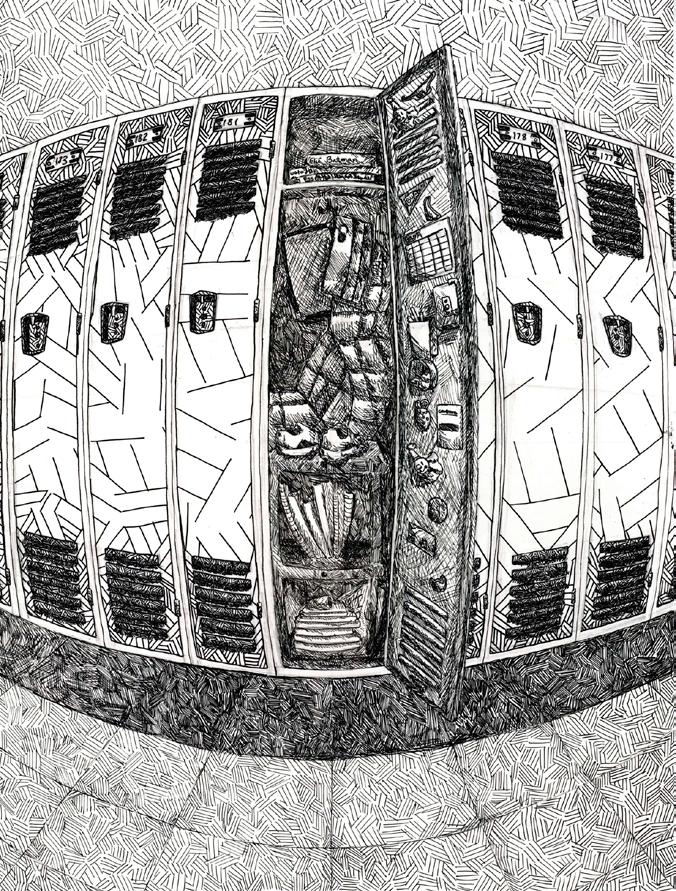
cygnus
and after it all? in the peak of day, under sun-straddled sky wings too heavy to fly? light will strike my face, and suddenly I will remember: goading sea-foam and highway euphoria the entire world whispering go, go, isn’t he beautiful? one hand in the long grass the other in the wind all of us leaning towards him, up and up and up. and what an ascent! red crescents ran their relays marked smooth as warm Bailey’s in dusk’s ruddy afterglow. and later, amid murmuring stars, moonflowers and I danced headspun by his likeness even through distance and time. and so in April when I am less than fallow, every floodplain part of me restless under salt-sown memory, I will stir, craving him again. and smoky stubble in bonfire afternoons and settling dust
Georgie Linscott ’26
Pump in Progress
Pattering raindrops tingle my hands
I’m as still as the land, right before an earthquake hits
Blood rushing to my limp fingertips
Gravity pulling on my reins
As my heart breaks through my veins
I stand here, a remnant of long ago
Feet planted, but I don’t grow
It’s painting me red, I feel like I’m dead, after you left
I don’t have the strength to move
I’m not thinking straight when I look after you
Fairy lights strung across night sky, in rain
You leave me in pain
Walking away
Try to succumb, but I’ve gone numb, as I see you run
Finn Hoebelheinrich ’26
The Beast
There was something else in the cave.
The beast raised its head. It could feel the heat from the newcomer and the vibrations from the unfamiliar motion on its skin. The beast shivered—it had been so long since it had felt any movement stronger than the water dripping slowly from the stalactites to the ground. The beast roused itself, moved slowly, newly, like some pristine thing just learning to walk, scraping across the cave floor, following the delicious warmth. It had been asleep for a long, long, time with no sustenance, but now there was something new. The small things, the little pinpricks of heat and fast vibrations, always moving, never touching the ground—they had long since been gone. There was no nourishment in the cave after that.
The beast did not need to eat often. It was an ancient thing, sprawling and ungainly, here since long before higher functions began to develop. It moved its head, slowly, carefully, tracing the thing as it stumbled across the cave, feeling the air shiver harder as if excited as the thing fell to the ground, advancing all the while, until finally, finally it reached the source of the newness and the warmth and the motion and bit down viciously, feeling the heat and the life fill its ancient body. The air shuddered once, violently, as the thing jerked in its last moments, before the cave was still again. And the beast ate, and, full of warmth that would last, it settled down to wait once more.
Balanced Pressure
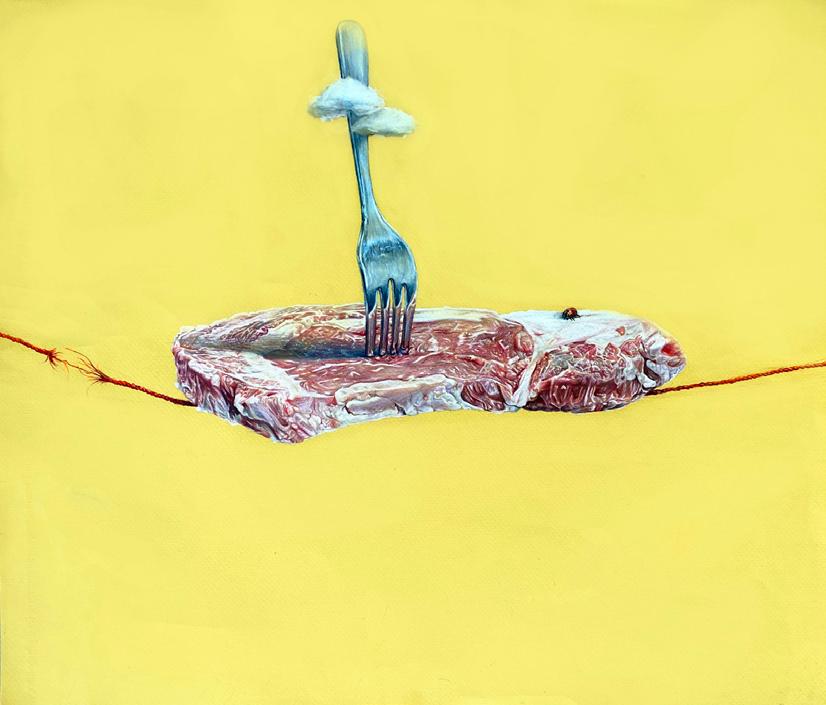
Camilla Horta ’26
Stories Close to the Heart
In days gone by, there lived a handsome prince named Emmanuel, who’s only dream was to bring prosperity to the people of his kingdom.
In a dark corner of his castle, Prince Emmanuel stared down at a map set before him. He wore a look of regal curiosity.
“What is this?” he asked authoritatively, pointing a long finger at the center of the parchment, marked with a rune of a sun setting behind steel.
“That, my liege, is the legendary sword in the stone. It will bring victory to Ibarra so your father may reign forevermore,” the Great Dame Andrea responded. “Long live the King,” Andrea added respectfully.
The mighty Prince drew himself up from his chair, a look of ambition crossed his face.
“Then we shall go and claim it . . for Ibarra, my beloved kingdom.”
The Dame and the Prince embarked on a treacherous journey. They encountered monstrous beasts and terrible terrains, but they prevailed and found their way to the Sword in the Stone.
As the mighty warriors approached what could be the salvation of Ibarra, Andrea turned to Emmanuel. She knelt beside him and held out her blade.
“It has been an honor to serve you, My Prince.”
A cry rang through the air as Andrea turned on Prince Emmanuel and slew him. The air resonated with a dissonant note: Andrea’s actions had sealed a horrible fate on the kingdom of Ibarra. Prince Emmanuel’s blood watered the stone and the steel, releasing a Power locked inside. Anastasia bowed as the Great Power rose from her tomb.
The storyteller of this tale, Davi Djalo, bowed his head, curls cascading over honey brown eyes. A roaring fire served as dramatic lighting, and my siblings and I were the theatrical chorus. At the end of Davi’s story, we all sang one mournful note, despair and doom on our faces. The small crowd that had gathered to hear Davi’s famous story-telling cheered.
My twin sister, Sana, stood to join Davi in front of the fire, who had broken his stoic pose with a grin. Sana looked gorgeous as she faced the crowd. Tiny curls snuck out from underneath her yellow headwrap and her red and yellow striped dress floated elegantly around her. Her dark brown skin took on a golden glow beside the fire.
“Davi and the Harunas, the greatest storytellers on the East Side of Ibarra!” Sana announced. “Thanks for listening! Donations are greatly appreciated,” Davi added, taking my twin’s hand and bowing.
Sana was the spokesperson for the Harunas. She sang in the chorus with us, but when it was time to arrange performances and speak with the audience, she represented us. Even before Davi had found us a year ago, she was always in charge. We didn’t mind—as long as the Harunas got to sing, we were happy. The only thing that made me itch the palm of my hand with irritation was this part—when Davi took Sana’s hand, and they bowed together.
I shook the uncomfortable feeling off as Sana and my youngest sibling, Ricardo, marched off to collect coins in a blue jar. Ricardo bounced on his feet, the jar almost as big as his 8-year-old head, growing afro and all. His grin showed off a just-lost tooth, and the coins in the jar tinkled like stars as he ran off, drowning out my “Don’t get lost!”
The other three Harunas bombarded Davi with “That was great!” and “Did you hear my low harmony? It really matched the mood!” and “You looked so cool with that lighting!” I stood to the side, shooting Davi a sympathetic smile as he tried to respond to everything coming out of the excited docinhos’ mouths.
There were six Harunas in total. Eight-year-old Ricardo was the youngest, Sana and I the oldest at 17. Alexandre, Adriana, and Maz, nicknamed the docinhos, were 11, 13, and 14 respectively. Together, we covered the most chaotic years of anyone’s life.
Davi just managed to get free from the docinhos when Sana and Ricardo returned from their rounds. A few people lingered, hoping to know when the next show would be or to ask worriedly if we had a place to stay for the night. Davi, Sana, and I gathered everyone up after a few more minutes, insisting with the docinhos and Ricardo that we should get going. They only agreed to put out the fire and head home when Davi promised them his signature pão de queijo.
Since Davi, Sana, and I were the oldest, the three of us brought up the rear as we walked deeper into our little neighborhood of Ibarra. Maz, holding Ricardo’s hand, led the way through the lantern-lit streets, with candlelight glowing from houses and apartments made of stone, plaster, and terracotta bricks.
When the half-moon hung right above our heads, we reached our home. The padaria downstairs had been long closed, and no longer smelled of warm bread, but of dust and pigeon poop. The floor above the old padaria, however, had been transformed.
It fit seven people pretty tightly, but the walls didn’t seem to close in. Instead, the small area embraced us, bounced our notes around when we sang, so when we hummed lullabies they would reach each sleeping child.
Davi got to work on dinner in a small kitchen that sat opposite of our sleeping area. Sana handed me the jar of coins. “Good job tonight Elana,” she said. “Your voice sounded beautiful, as always.” She winked, then moved to help Davi chop up some onions.
I brought the jar to my bed and dragged a pale pink wooden box from under it. It was heavy with the weight of money, and I added the coins, counting everything carefully, taking out what we would need for food tomorrow, and calculating when we’d have enough coins to make a trip to the bank. The docinhos were all sitting on Maz’s bed, gossiping about who knows what. I noticed Ricardo patiently waiting at my feet, playing with his stuffed dog, and I closed the lid of the money box, sliding it back under my bed.
Ricardo jumped up with a grin. “Want to play with me Elana?” he asked excitedly, offering me my own stuffed animal, a silver and blue elephant. We all had one—a gray bear sat on Sana’s bed, Davi’s red dragon had tumbled off his pillow onto the floor, and the docinhos’ animals were probably scattered around the kitchen. It still puzzled me why, when we had joined up with Davi, he had insisted we buy the toys as soon as we had money to spare. I also knew I was probably too old to be playing with Ricardo, but I mainly did it to see him happy.
I sat down on the floor with him and we played until the smell of melting cheese and hot bread was impossible to ignore, drawing us all to our feet and into the kitchen.
We served our food— one piece of bread, a spoonful of rice with bits of eggs, carrots, and peas—then scattered around, occupied with scarfing down the meal.
Sana, Davi, and I sat on the floor next to each other, our backs against a wall.
I felt Davi’s curls brush the top of my head as he turned to me. “How much did you count?” he asked between bites. Sana watched me expectantly, too, and I almost laughed at the contrast between them. Davi looked confident and content—every night we made more money than the last, and he knew it. Sana looked worried, if a little hopeful, as if she was counting the days until our luck disappeared and we were back on the streets.
“Four thousand escudos,” I told them with a small grin. Davi returned to his food with a satisfied nod, but Sana’s eyebrows drew together.
“Enough for two days of food,” I assured her, and then she smiled. We performed every night, so two days of food really meant one day of food and a whole lot of money saved in case of any emergencies Sana always seemed to be worried about. I felt a warmth in my chest because of our success, but it was rudely doused when I noticed the way Davi was entranced by Sana’s smile. I turned to my food and tried to ignore his arm pressed against mine and the lump in my throat.
I finished my food last, so I urged my siblings to go to bed while I collected their dishes in a bucket. “Don’t worry, I’ll wash them! You can go to sleep, it’s late,” I told Sana when she tried to hold onto her plate. She let go with a nod, and started rushing everyone else into bed.
It really was late—I felt the good kind of exhaustion that came after a successful day and a good meal. I precariously balanced the bucket of plates with a cloth, some soap, and a lantern before starting down the stairs. Davi caught up with me and took the bucket from my hands. I couldn’t stop my mouth from curving into a smile. “You don’t have to come with me every time,” I told him.
“But then who will protect you from the criminals roaming the streets?” he wondered dramatically. I shrugged as we reached the first floor and ambled outside, heading towards the water well around the corner. “I don’t see why any criminals would want to rob me of a couple plates.”
“Those are high quality plates!” Davi protested.
I smiled again. “Of course you’d say that, since you bought them.”
“With my hard earned money, I might add.”
“Who’s hard earned money?”
Davi’s honey brown eyes flashed the gold of my lantern as he rolled them. We reached the wooden well and Davi set the bucket down and hurried to draw some water from the well. I stood beside him, watching the water pitcher rise slowly as Davi pulled on the rope. “You know . . . I’ve always wondered if there would be an easier way to get water up to our kitchen,” he mused between tugs. “Like collecting rainwater?” I asked, curious. Davi shook his head, his curls bouncing and his eyes shining with the light of a new idea. “No like . . . a river that goes up, or a well inside the walls.”
I laughed, and Davi gave me an amused smile. “Ridiculous?” he asked. I shrugged. “Maybe. It sounds like magic,” I told him, helping him pull the water pitcher out of the well.
He poured the water into the bucket and started scrubbing dishes. I attached the pitcher back onto the rope to get more water to bring back with us.
“There’s magic in Kevani, you know,” Davi whispered. His voice always became uncharacteristically small when he spoke of where he’d grown up. The way he talked about it, Kevani seemed like a mythical land. It was across the southern ocean, by the sea, and now Davi was saying there was magic there. I pulled on the rope, but turned to Davi. “Really?”
“Yeah. Magic in stories. In music.” He glanced at me then, and I almost let my hold on the rope slip. My cheeks heated, and I turned back to look at the dark waters of the well.
Davi loved Kevani, we all knew it. And he said my singing reminded him of home. Of course, he meant all of our singing. My parents were from Kevani, but we were taken away across the sea when Sana and I were only six years old, the docinhos all babies, and Ricardo unborn. We were sent to live in Ibarra’s orphanage for foreigners, and I thought I would never see my parents again. But one night, they arrived at the orphanage with a baby in their arms: Ricardo. And that was really the last I’d seen of them. All we had left of them were our voices and our drive to never stop singing.
I thought about all this as Davi and I finished the chore in silence. No matter how hard I tried, I couldn’t remember Kevani. I could only remember Davi, telling us stories about it, glowing as if some magic was still left in him.
Angela Noyes ’25
Oil Paint Canvas
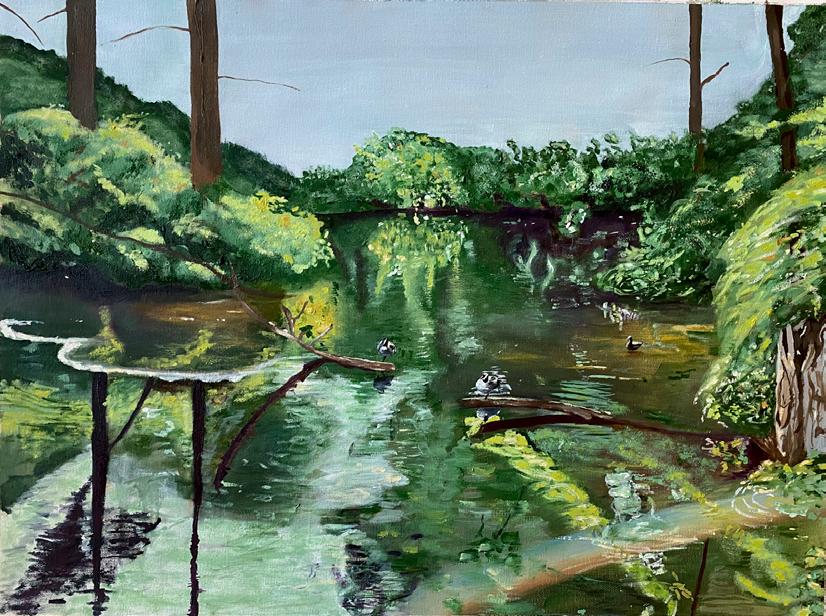
Prettiest Poppies
Behind all of the black coats and grey shawls, Are trees so tall, an eon to watch the leaves fall, Among the black dress shoes, wet of puddles, Pretty poppies ascend in small bundles.
Above the clouded faces, wet from cries, Fly royal black-feathered kings of the skies, They perch up high and watch the blessed, The ladders, the shovels, and all the rest.
These familiar feet always return anyway, With the trampled grass beds that will forever stay, Even the grieving flowers shine so bright, Missing their sun in the eternal night.
It must have been a river of their tears, Since all around the ground is dry, Upon which some words on the dirt mounds cry, The names of those who repose six feet below.
Daniel Shaer ’26
’Til Death Do Us Part
I marvel over her. Her elegance, her beauty. Every minute of every hour I think more about how I want her. I want her for my own and my own only. I always think, what would it be like if the world was on my side, if the cards were stacked in my favor, would I have her? Would I have everything I ever wanted? Maybe I’ll never know. All I know is it’s going to be okay. These words I think as I listen to the sounds of her screams, as I lay the last shovel of dirt.
The earth was closing in on me. My screams finally turned to silence as the realization of my future finally fell upon me. His psychotic mutters were now the only sound in an otherwise departed world. The darkness around me was so complete yet so limiting—silently encompassing not only my body but also my thoughts. Already, I can feel the cold hands of the other side, reaching, pulling me down when I am already at my lowest. As I took my last breath, I realized what better way to die than at the hands of the person I loved most.
Georgie Linscott ’26
Wearing Yellow to a Funeral (Raincoat Girl)
You’re wearing yellow to a funeral, raincoat girl
Having marched through the rain storm past the boiling, echoed spring
All stared in solemnity at the turned earth but you’ve got on your cheerful ring
Breaking mirrors, at rocks you fling seeing yourself only in refractions
The other kids whistle at your actions
Tortured soul, now you’re whole; wearing yellow to a funeral
Hide behind your purple shirts as your heart hurts
We know your mind is left to dry
Memory vaults now all burning purple smoke starts reforming
My little newborn raincoat girl
Digital Drawing Milky Way
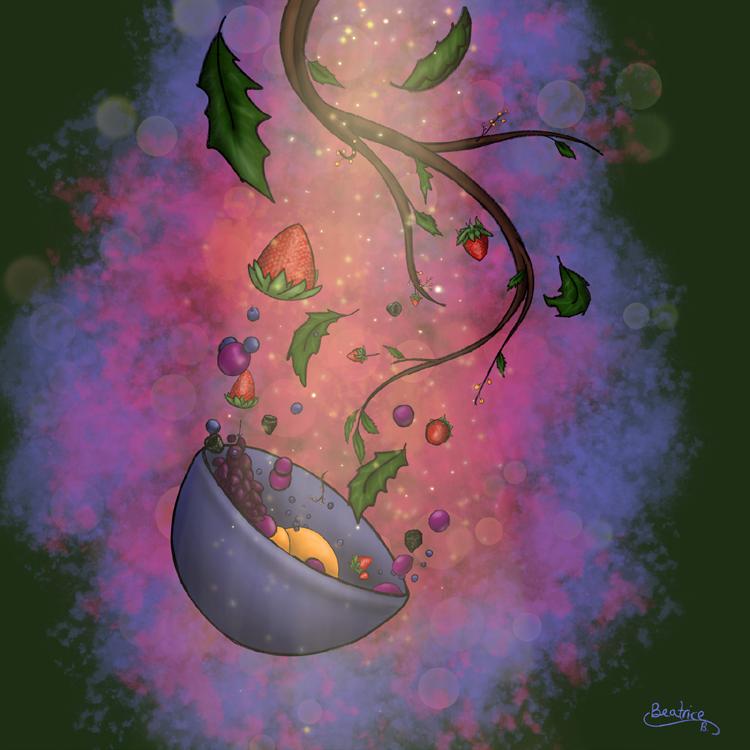
Genevieve Gouvernet ’27
When I Crashed to Earth
When I crashed to Earth, I was scared, shattered, and alone. My journey up until this point had been turbulent, to say the very least. I staggered to my feet in this foreign and frightening new world. Battered. Bloody. Broken. I looked around, blinking in the light after a long trip through the darkness. Everything looked and felt strange, but instinct told me that going home was not an option. Then, a question occurred to me. What was home? It wasn’t where I was born, nor where I grew up, nor where I’d just come from . so where was it? I took my first steps as an orphan of reality.
When I crashed to Earth, I never expected to find . this. It was a strange world, all twisted up . . . and yet, people were happy. Nothing was perfect, but it was lovably flawed. People yelling alongside their vehicles at every minor inconvenience was somehow comedic. People turning bad days into fuel for their next joke. Laughter. Community. A gray city. A bluish sky. A spot of green, every so often. Everything was faded, but not in a way that seemed like it was once vibrant. It was gentle, like the nostalgic memory of a faded photograph you’d never seen before. It was neither overbearing nor fully intact. And as I stood, watching cliques flooding into buildings, I couldn’t help but feel alone.
When I crashed to Earth, I realized that, here, I was an alien. I had never been one before. Well, that’s not entirely true. I’d been one on another planet, but my visit had been too brief for me to realize. It was a bump on the shoulder of someone passing on the sidewalk with a nod and wave and a “sorry.” Nothing more. I didn’t have time to feel alone, but at least I had someone, even if it was just a passerby. Here, I had nobody. Just memories, regrets, and the longing for my shattered starship. People stared, and yet nobody seemed to notice me at all. It was a strange oxymoronic joke of my life that everyone but me was in on. It was like the Earthlings were a hive mind; so judgmental, yet too polite to point out the obvious uniqueness of my appearance. I watched cliques forming—or maybe they had already been in place—and I just couldn’t keep up. So I stopped trying. It was understandable, wanting to steer clear of an extraterrestrial. And just when I felt most alone, that’s when they sat beside me.
When I crashed to Earth, I expected to be alone. I looked first to my right. The left came later. I wasn’t . . . alone? It was confusing. Maybe rumors of my extraterrestrial origins had gotten around and they felt bad. I didn’t expect them to stay long. A pat on the back and a “poor alien”. So I just waited. Made small talk. And then, before I realized it, hours had gone by. Words took on more meaning than they had before. I was lucky I figured out the language. The walls of failures past toppled like the ruined cities I had convinced myself I had destroyed . . . it turns out these people had old bricks, too. Now we are building a new city together, day by day, brick by brick. There are doors and windows and room for anyone to join. For the first time in my life, I don’t find myself unlovable. I realize that maybe I am not doomed to float from planet to planet, ruining cities that I had tried to help build. I find, now, that when I smile, I mean it. I have my circle. My herd. My clique that I, too, can flood into the building with, talking too loudly and not really caring who hears. Everyone else was too loud anyways. Really, I’m just taking notes, following suit, and trying to fit into this strange, foreign planet.
When I crashed to Earth, I had a lot of fears and expectations of the blue and green, smog-covered almost-sphere as I realized where I was. Although my journey is far from over, the starship still in shambles and old injuries still unhealed, I finally feel . . . home. So, this is it. That feeling of belonging, even in somewhere I don’t belong. Making people smile with just some words and my own face—something I’d never been able to do before. That buzzing feeling bouncing around my ribcage like a pinball, gaining momentum as the purple bullet shoots down its track, heading toward my favorite crowd. I thought I wouldn’t fit into this world because I wasn’t perfect, but I’ve found that being imperfect—as this herd of mine helped me realize—is what makes me fit in. This world still expects perfection, but I’ll be alright, even if I don’t deliver. I’ve found my way home. I’ve learned what it feels like to be loved. Appreciated. It’s hard to believe, but it seems to be true. Honestly, this happiness was the last thing I had expected to find when I crashed to Earth.


